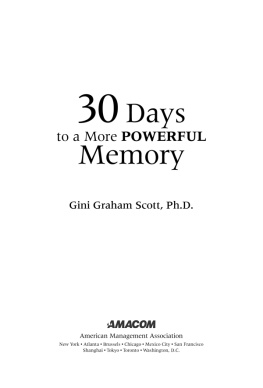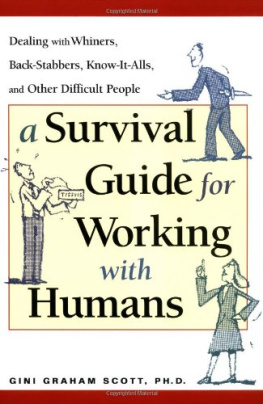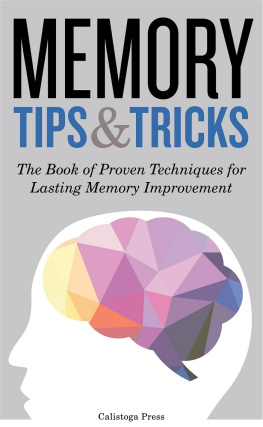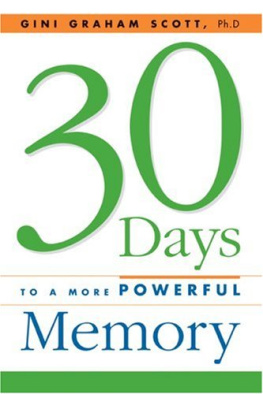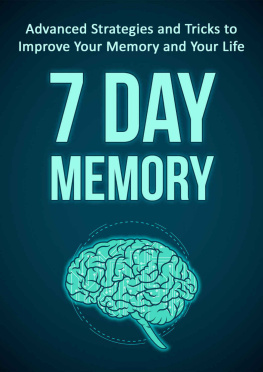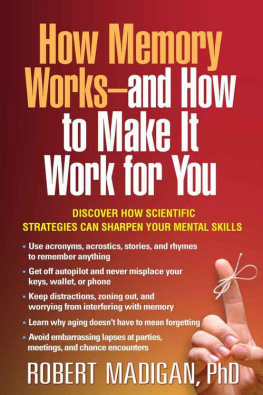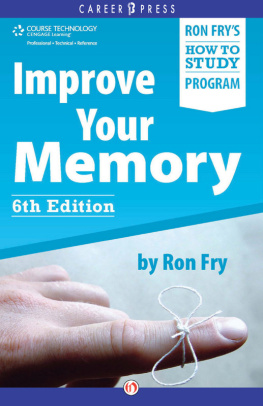30 Days to a More POWERFUL Memory
Gini Graham Scott, Ph.D.

Special discounts on bulk quantities of AMACOM books are available to corporations, professional associations, and other organizations. For details, contact Special Sales Department, AMACOM, a division of American Management Association, 1601 Broadway, New York, NY 10019.
Tel: 212-903-8316. Fax: 212-903-8083.
E-mail:
Website: www.amacombooks.org/go/specialsales
To view all AMACOM titles go to: www.amacombooks.org
Library of Congress Cataloging-in-Publication Data
Scott, Gini Graham.
30 days to a more powerful memory / Gini Graham Scott.
p. cm.
Includes bibliographical references and index.
ISBN-13: 978-0-8144-7445-7 ISBN-10: 0-8144-7445-4
1. Mnemonics. 2. Memory. I. Title. II. Title: Thirty days to a more powerful memory.
BF385.S36 2007
153.14dc22
2006032832
2007 Gini Graham Scott, Ph.D.
All rights reserved.
Printed in the United States of America.
This publication may not be reproduced, stored in a retrieval system, or transmitted in whole or in part, in any form or by any means, electronic, mechanical, photocopying, recording, or otherwise, without the prior written permission of AMACOM, a division of American Management Association, 1601 Broadway, New York, NY 10019.
Printing number
10 9 8 7 6 5 4 3 2 1
Dedicated to the many people who gave me suggestions on how to remember, including Felix Herndon, who invited me to sit in on his Cognitive Processes class at Cal State, East Baya source of much inspiration for many of the memory principles described in the book.
Contents
Introduction
Everyone wants a better memory and in todays information-filled, multitasking age, having a good memory is more important than ever. Whether you need to keep track of your e-mail messages, impress the boss, give a speech, organize a busy social schedule, remember whom you met where and when, or anything else, a good memory is a necessary tool for staying on top of things. Its especially critical if youre part of the Baby Boomer generation or older, because memory loss can accompany aging. But if you keep your mind and memory limber, you can rev up your memory powerin fact, itll even get better with age!
30 Days to a More Powerful Memory is designed to help anyone improve his or her memory. Besides drawing on the latest findings from brain and consciousness researchers, psychologists, and others about what works and why, Ive included a variety of hands-on techniques and exercises, such as memory-building games and mental-imaging techniques.
While some chapters deal with basic ways of preparing your mind and body to remember more, such as improving your overall health and well-being, the main focus is on the techniques you can use day to day to improve your memory. Plus Ive included chapters on creating systems so you have memory triggers or you can reduce what you have to remember, so you can concentrate on remembering whats most important to you. For example, you might feel over-whelmed if you have 20 tasks to keep in mind for a meeting; but if you organize these by priority or groups of different types of tasks and write down these categories, you might have a more manageable organization of activities to remember.
Its also important to personalize developing your memory, so you work on increasing your abilities in areas that are especially meaningful for you. By the same token, it helps to assess where you are now to figure out what you are good at remembering and where there are gaps, so you can work on those areas. Keeping a memory journal as you go through the learning process will help you track your progress, and will help you notice what you forgot, so you can work on improving your weak spots as well.
Since this is a book on improving your memory in 30 days, you should focus on committing a 30-day period to working with these techniques. You dont necessarily have to read the chapters in a particular order. In fact, you may want to spend more time on certain chapters and skip others. Thats fine, but the way you use your memory is a kind of habit, and it generally takes about three weeks to form a new habit or get rid of an old one, plus an extra week thrown in for good measure. So this 30-day period will be a time when you hone new memory skills and make them a regular part of your life. With some practice, you will find that these techniques become an everyday part of your life, so you dont even have to think about them. You will just use them automatically to help you remember more.
Ive also included a few introductory chapters that describe how the brain works and the different types of memory that create a memory system. This is a little like having a memory controller in charge as you take new information into your working or short-term memory, decide what bits of memory you want to keep and include in your long-term memory, and later seek to find and retrieve the memories you want. But again the focus is on using what you have learned to better apply the techniques that incorporate those principles. Youll also see helpful tips from people I have interviewed on how they remember information in different situations, and I have included examples of how I apply these techniques myself. Some of these techniques are memory games that I have developed to make increasing your memory fun. While the focus is on using these memory skills for work and professional development, you can use these skills in your personal life, too.
Back in high school and college, it was always a struggle for me to remember details. When I took a class in acting in my junior year, I found it especially difficult to remember my lines. Later on, I still had difficulty remembering things. For example, if someone asked me to repeat something I had just saidsuch as when I was being interviewed for a TV show or teaching a classI could never remember it exactly, though I could answer the question anew. Yet, looking back, I can remember quite vividly my struggles to remember, even imagining where I was, the appearance of the room, and the like. Thats the way memory works. When you have images, when something is more important for you, when you use multiple senses to encode the experience in the first placewhen you dont just try to recall words on a page or a series of spoken wordsyou will remember more.
Over the years, I learned specific ways to enable me to remember things better. Now, since I have been working on this book, I have found even more techniques to improve my memory. I think youll find the same thing as you read through the chapters.
So get ready, get setmark your calendar and get started on improving your memory over the next 30 days. Of course, youre also free to condense the program into fewer days or extend the process if necessary. Thirty days is optimalbut adapt the program so its best for you.
1
How Your Memory Works
To know how to improve your memory , it helps to have a general understanding of how your memory works. I have created specific exercises based on this knowledge, exercises that will help you improve in each of the areas of your memory.
The roots for the way we think about memory today actually have a long history, dating at least back to the time of the Greeks, and perhaps earlier. Accordingly, I have included a little history about the way psychologists have thought about memory that has developed into the model of memory that psychologists commonly hold today and that I use in this book.

